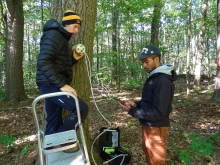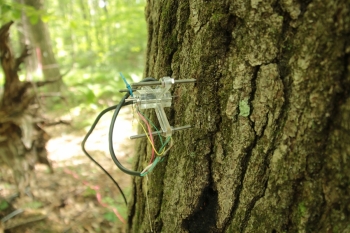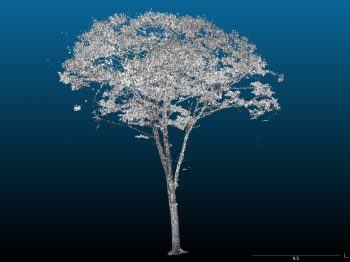You are here
Trees Telling STEM Stories: Free Online Workshop for Teachers

WHAT: No-cost, virtual workshop introducing a Harvard Forest research and social media initiative about trees’ changing environments.
WHO: For Massachusetts middle and high school STEM teachers and informal educators. Led by scientists and educators from Harvard University (Harvard Forest) and Boston University.
WHEN: Thursday, August 26, 10:00am – 4:00pm (register by August 13)
WHERE: Online, no cost
WHY: Learn and practice new ways to teach about trees’ growth, ecosystem benefits, and climate dynamics, using real-time, sensor-based STEM data (no tech/data experience necessary) from the nation’s first network of tweeting trees. 5 PDPs available to Massachusetts teachers. A limited number of post-workshop stipends available (see below).
Background

This summer, three Massachusetts trees are being outfitted with sensor kits measuring their growth, water/sap flow, seasonal changes, and local climate.
Data coding enables those sensors to send messages to a social media account for each tree (see example), highlighting real-time experiences in each tree’s life (such as a heat wave or heavy rain event) and explaining their biological and ecological importance.
Social media messages include graphs, photographs, data summaries, and conversational explanations that cover content themes including climate, tree anatomy and physiology, carbon, photosynthesis, food webs, the role of trees in ecosystems and human society, and more.
Each new Witness Tree will be located in a different type of ecological community:
- RURAL: Red Oak (Quercus rubra) in a forest at Harvard Forest, Petersham, Mass.
- SUBURBAN: Sugar Maple (Acer saccharum) in an agricultural setting at Drumlin Farm Mass Audubon Sanctuary in Lincoln, Mass.
- URBAN: American Elm (Ulmus americana) on the Town Common in Cambridge, Mass.
Teacher Workshop Format & Goals
Morning STEM presentations will cover:
- The technology behind the tweeting trees:
- ---the science of the sensors measuring growth, sap flow, seasonal change, climate, and more
- ---a summary of the coding process that analyzes incoming sensor data and long-term data archives, and outputs messages for social media
- The natural history and physiology of the 3 trees, including how environmental factors such as climate change influence their growth and community dynamics.
- Opportunities for using the tree’s data/messages as a STEM teaching tool, incorporating state/national science teaching frameworks
An afternoon of guided independent & group work will give educators an opportunity to:
- Choose a Witness Tree and brainstorm their own teaching approaches and learning goals for using its data/messaging outputs
- Connect directly with town/organizational leaders, who will use educator feedback to draft new message coding for their local tree
- Work with mentorship by the scientists and educators leading the Witness Tree project
Post-Workshop Follow-Up
After the workshop, project scientists and educators will be available via email to answer questions about the project during the coming academic year.
A limited number of $100 stipends are available to workshop participants who provide a post-workshop reflection statement on the feasibility of using this project in their teaching. Additional $150 stipends are available to participants who pilot a lesson and send a reflection statement and student work samples.
 Registration
Registration
Are you a Massachusetts educator of middle/high school students? Register for the workshop (it’s free!) by August 13 here. We will follow up with a confirmation shortly!
The first 5 registrants will be mailed a copy of the book Witness Tree by Harvard Forest writer-in-residence Lynda Mapes.
Registration is especially encouraged for educators working in communities near the three Witness Trees, and for educators who belong to or teach students from racial/ethnic groups that have been historically excluded in STEM.
This workshop is funded by the Harvard University Climate Change Solutions Fund, and supported by scientists from Harvard Forest and Boston University, and educators from the Harvard Forest Schoolyard Ecology Program. Long-term data streams for the Harvard Forest Witness Tree are courtesy of the Long-Term Ecological Research Program of the National Science Foundation.
Questions?
Contact Clarisse Hart, HF Director of Education & Outreach, at hart3@fas.harvard.edu or 978-756-6157.
(Images, top to bottom, by Sarah Plisinski, Shawna Greyeyes x2, and Lidar scan of the HF Witness Tree courtesy of the Schaaf Lab at UMass Boston)

